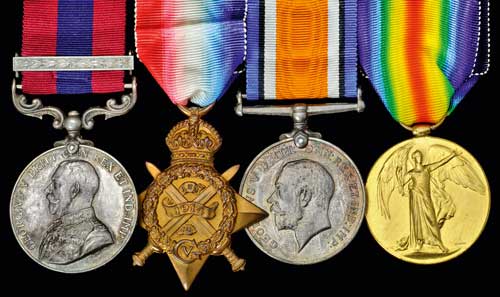
Auction: 12002 - Orders, Decorations, Campaign Medals & Militaria
Lot: 443
The Great War 1915 ´Neuve Chapelle´ D.C.M. and ´1916´ Bar Group of Four to Corporal G. Smith, Royal Engineers, For Conspicuous Gallantry in Rescuing in Broad Daylight Under Heavy Machine-Gun Fire Two Wounded Men Lying Near The Enemy´s Wire a) Distinguished Conduct Medal, G.V.R., with Second Award Bar (19344 Sapr. G. Smith. 15/F.Co. R.E.) b) 1914 Star (19344 Sapr: G. Smith. R.E.) c) British War and Victory Medals (19344 A. Sjt. G. Smith. R.E.), virtually mint state, with three original named card boxes of issue, and the following related items: - Record Office enclosure for the British War and Victory Medals - The recipient´s 1914 Christmas postcard from Lady Rawlinson - Four photographs of the recipient, including one of him shoeing a horse, c.1908 - Copy of the recipient´s Obituary, reprinted from the Lincolnshire Standard, 2.11.1918 (4) Estimate £ 2,800-3,200 D.C.M. London Gazette 30.6.1915 19344 Sapper Smith, G. 15th Field Company, Royal Engineers ´For conspicuous gallantry and devotion to duty at Neuve Chapelle, on 10th March, 1915, in continuing to make loopholes and block up openings in a wall, under heavy rifle and machine gun fire, and completing the work though bricks were frequently knocked down after being set in position. Sapper Smith has previously displayed great steadiness under fire.´ D.C.M. Second Award Bar London Gazette 22.9.1916 39344 Actg. Cpl. G. Smith, R.E. ´For conspicuous gallantry. He voluntarily crossed over 300 yards of "No Man´s Land´´ in broad daylight, and, though fired at by machine guns and rifles, dressed the wounds of men lying near the enemy´s wire. After collecting food and water for them from dead men lying round, he, assisted by a corporal, partly dragged and partly carried the two worst cases back to our lines.´ 19344 Corporal George Smith, D.C.M., was born in Kirton, Lincolnshire, 1888, and prior to his Army service was employed as a village blacksmith. In 1908 he enlisted in the Royal Engineers, and was posted with them to Gibraltar; following the outbreak of the Great War he served on the Western Front for three years from 5.11.1914, before returning to England in 1917 suffering from the effects of gas; advanced Corporal and acting Sergeant, he subsequently served as Drill Instructor for the 1st Reserve Battalion, Royal Engineers at Chatham. Corporal Smith died of pneumonia, 24.10.1918, and is buried in Kirton Old Cemetery, Lincolnshire. Following his death the General Officer Commanding, Brigadier- General A.L. Schrieber, C.B., C.M.G., D.S.O., paid tribute to him, ´saying that he had knew Corporal Smith personally as a soldier, and a better soldier he had never met. Not only as a fighting soldier in France, but as a soldier at home, he was one of the best N.C.O.s, and he knew he would sooner have died on the battlefield than have died as he did, and he was proud of having had the honour of pinning the D.C.M. and Bar on his breast.´ (Lincolnshire Standard, 2.11.1918 refers).
Sold for
£4,500




